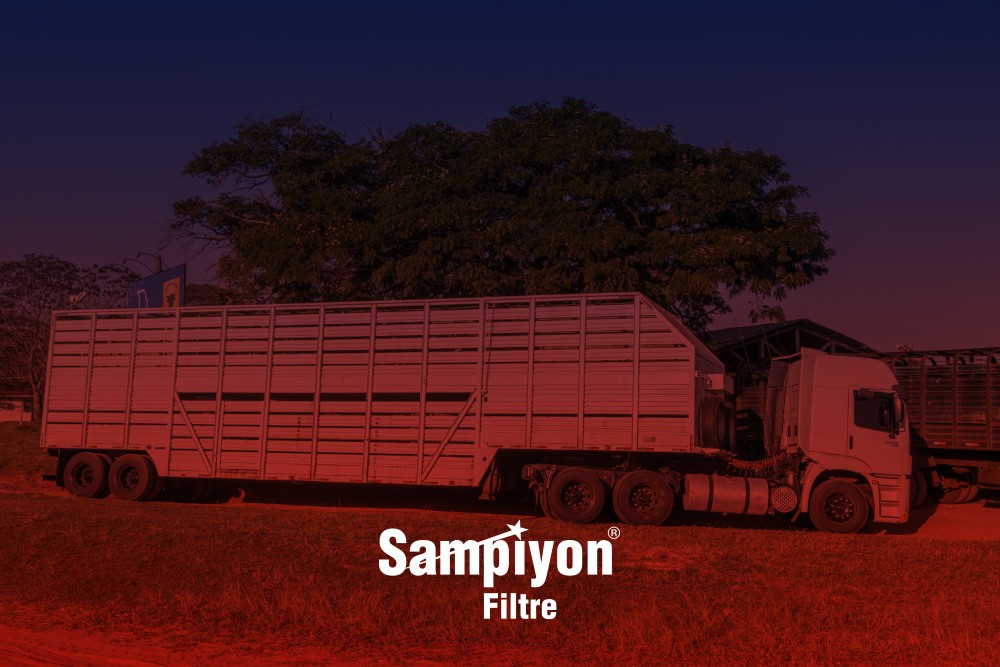
What is Air Filter?
Şampiyon Air Filters For Fuel Savings!June 27, 2022
The air taken from the atmosphere is the basic operating factor of every internal combustion engine, which is the drive unit in motor vehicles, construction equipment, airplanes and helicopters. The engine needs a minimum of 14.5 kg of air to burn 1 kg of fuel. During operation in nominal conditions, passenger car engines absorb 150-400 m3 of air per hour. For truck engines, the value is 900-1400 m3/h, for the engine of the Leopard 2 tank it is over 6,000 m3/h.
Combustion engines absorb various pollutants along with the air. Mineral dust, which is raised several meters above the ground by the movement of vehicles or by the wind, is a common harmful air pollutant for operated technical equipment. The concentration of dust in the air is a characteristic feature of polluted air and its measure is the mass of dust (in grams or mg) contained in 1 m3 of atmospheric air. Typical concentrations can range from 0.01 mg/m3 in clean rural environments to around 20 g/m3 in desert heavy vehicle convoys [1].
Air filters trap this mass of dust, give the engine the clean air necessary for combustion and protect the engine against wear.
In inlet air filtration systems in modern passenger car engines, single-stage filters with panel filters made of pleated filter paper are used. Trucks, heavy vehicles and other vehicles operated in high dust concentration conditions are often equipped with two-stage filtration systems.
The first stage is the inertial filter (pre-filtration), where larger particles are trapped, and the second filtration stage is the cylindrical porous panel filter made of pleated filter paper. By performing the final filtering process, it provides clean air to the combustion chamber and protects the engine and its components against wear.
What is Air Filter Function?
Road surfaces are places where particles from many different sources are deposited. First of all, it is mineral dust blown by the wind from the soil surrounding the road, sand and desert areas that cover about one-third of the earth's surface [1]. These include dust generated during fieldwork, roadwork or construction work. Particles may include salt used for defrosting, plant matter, pollen, animal hair, and other biological materials in the environment [2]. Apart from natural processes, significant amounts of dust particles are formed as a result of human activities, including agriculture, industrial production and mining [3].
Pollution from human sources includes particles released into the atmosphere as a result of brake and coupling components [4,5,6] and friction during tire contact with the road [7,8,9]. These include particles from the engine's exhaust gases, including soot, and particles that will cause corrosion of engine components.
Engine wear is caused by dust particles between 1-40 µm and the most harmful particles occur in the range of 1-20 µm [1, 8]. The most common is dust suspended in the air, the main component of which is silica (SiO2) and in which the amount of dust is in the range of 60-90%, but also with high hardness.
Silica is a major cause of high engine component wear, including piston rings, cylinder sleeves, crankshaft main bearing journals and sleeves, valves and valve guides [14]. This shortens the service life of components. The task of the air intake system in internal combustion engines is to supply air to the engine cylinders in appropriate quantities and with appropriate parameters in order to ensure the correct course of the fuel combustion process in the engine cylinders.
An important task is to provide the engine cylinders with air of suitable quality (cleanliness) to minimize wear of engine components. Another task of the intake system is to dampen the noise of the combustion process in the engine and increase engine power.
A properly designed engine air filter reduces the dust concentration in the engine intake air to an acceptable level, has low restriction, reduces engine noise, is not a source of flow noise, and has high operating reliability. It should be simple, small, inexpensive and easy to service.
To find the air filter suitable for your vehicle, you can review our car filters catalogue.
In addition, you can review our most preferred air filters by clicking on the links.
What is the Air Filter Lifespan (Replacement Frequency)?
The air filter is the engine's breathing system. When they become clogged, quality of the air supplied to the engine is affected. For this reason, it leads to inefficient combustion of the fuel. If the air filter has become very dirty and restrictive, it is recommended to replace it. The vehicle often shows poor performance, increased emissions and other symptoms. When these symptoms are noticed, the air filter should be replaced as soon as possible.
A clean air filter can save fuel, protect your engine from wear and provide many other benefits. Although the air filter clogging varies according to the environment in which it operates, the air filter should be replaced every 30,000 - 35,000 Km for a passenger car, every 25,000 - 30,000 Km for a light commercial vehicle and every 20,000 Km for a heavy commercial vehicle.
What Are the Symptoms of an End-of-Life Air Filter?
Engine Sounds Car sounds can be caused by different components. Dirty air filter is one of them. When your vehicle is performing normally when moving and the engine is started, there should be smooth running with barely noticeable vibrations. If vibrations are unusually loud, it could mean a bad air filter. It is also an indication if there are sounds like small explosions.
Engine Warning Light

In the combustion cycle of many modern engines, a large amount of air is required to burn a small amount of fuel. If the air filter is clogged, there will not be enough air for each combustion cycle. Therefore, the engine warning light may come on. In order to understand the cause, it is necessary to determine the error code with the vehicle computer at auto services.
Gasoline Smell The gasoline smell in the car may indicate unburned fuel. This usually happens when starting the car. If the filter is very dirty, it will not pass enough air to ensure efficient combustion. As a result, gasoline fumes come out of the exhaust. This means that the air filter is damaged and needs to be replaced immediately.
Dirty Air Filter

A new filter is usually white or, when new, a near-white color. Over time, the filter material darkens due to the accumulation of dust and particles on it. You can easily spot a dirty filter by its appearance. It is recommended that you make the air filter inspection routine during each vehicle maintenance. That way, you know the filter is nearing the end of its life.

Reduced Fuel Economy When there isn't enough air, engine systems burn more fuel. If your air filter is clogged, your car will be consuming more fuel than normal.
Reduced Horsepower When the air filter is dirty, it cannot allow sufficient airflow to the engine. When you step on the accelerator, you may experience harshness. This is an indication that the engine is not operating at sufficient power. While there are several causes for the mentioned symptom, a dirty air filter is one of them. If you notice symptoms, we recommend checking your air filter.
Black Smoke or Flame in Exhaust

If you notice black smoke or flames coming out of the exhaust pipe, it is a sign that the engine is not receiving enough air. The air filter is probably dirty and severely clogged. It is a risky and dangerous situation that must be dealt with immediately. The combustion cycle cannot burn all the fuel due to insufficient air supply, causing unburned fuel to come out of the exhaust. As the fuel passes through the exhaust pipe, it can even produce some explosive sounds. It is recommended to take your vehicle to auto service as soon as possible.
Şampiyon Filter was founded in 1985 as a small family business that was founded in İskenderun. Our company, which has been named “Champion” since its first foundation, has been targeted as “Success in filtration”, and has been transformed into a larger family with more than 35 years of experience, and continues to produce high quality oil, fuel, air and hydraulic filters to automotive, agricultural, business machinery and commercial bus and truck groups in accordance with national and international standards.
References
- [1] Tadeusz Dziubak and Sebastian Dominik Dziubak. Experimental Study of Filtration Materials Used in the Car Air Intake. Materials (Basel). 2020 Aug. 13(16). 3498.
- [2] T. Dziubak. Material Properties Analysis with Addition of Nanofibres for Air Intake Filtration in Internal Combustion Engines. International Journal Of Automotive And Mechanical Engineering. (2021). 18(1). 8621 – 8636.
- [3] S.Karthikayan, B.Nagalingeswara Raju, G.Sankaranarayanan, M.Purushothaman. Study of Air Intake System of Turbo Charged Diesel Engines. Frontiers in Automobile and Mechanical Engineering.2010. 175-178
- [4] T. Jaroszczyk, J. Wake, M. J. Connor. Factors Affecting the Performance of Engine Air Filters. Journal of Engineering for Gas Turbines and Power.2010. 115 693-699.
- [5] Air Filter: The Definitive Guide - MZW Motor
- [6] Effect of Dirty Air Filter on Performance - Konvoy Otomatik Onarım (convoyautorepair.com)


.jpg)